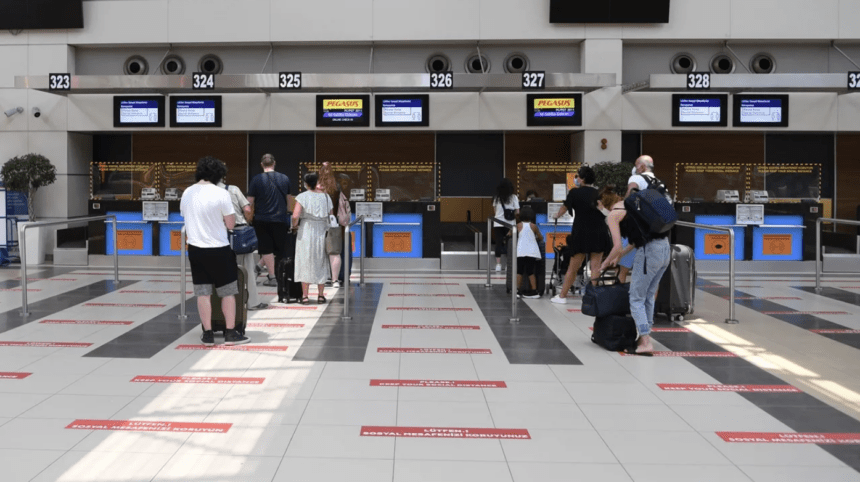About 250 thousand foreigners left Turkey in 2023 according to official immigration data. The number of foreign nationals with residence permits in Turkey decreased by 247 thousand people in 2023 compared to the previous year due to the silent policy change. Even during the pandemic, the number of foreigners leaving Turkey was 214 thousand.
The Directorate of Migration Management announced the number of foreigners in Turkey with residence permits in 2023 and their distribution by provinces. According to the data of the Directorate, the number of foreigners in Turkey with a residence permit decreased by 247 thousand 62 people in 2023 to 1 million 107 thousand 32. In 2022, this number was 1 million 354 thousand 94. The number of foreigners leaving Turkey in 2023 was the highest since the data started to be announced. The largest decline before that was in 2020, the year of the pandemic, when 214 thousand 377 people with residence permits left Turkey.
In addition to the rising cost of living and economic problems, international sanctions against the Russian Federation, the military conscription of Russian youth, and the difficulties in obtaining residence permits have contributed to the departure of foreigners.
Dilution policy was effective
Commenting on 2023’s record-breaking “reverse migration” movement, Metin Corabatir, President of the Center for Asylum and Migration Research, said that it is not possible to make a clear analysis due to the lack of detailed data, but pointed out that about 150 thousand Ukrainians and Russian citizens came to Turkey after the war between Russia and Ukraine. Emphasizing that Ukrainians in particular have been staying in Turkey under the so-called “subsidiary protection” status, Corabatir said, “Some of those people have either returned to their countries or gone to Western countries.” Metin Corabatir shared the view that a second reason for the record reverse migration is the government’s efforts to dilute the number of foreigners. Reminding that this policy is mostly applied to “non-resident” foreigners, Corabatir said, “From the numerous information received by our Asylum and Migration Research Center, we understand that the government is being tight-fisted in terms of new residency and extension of residency, some of them are not extended. Long-term residence has become more difficult in the fight against irregular migration. This could also be a factor.”
Short-term permits terminated
Prof. M. Murat Erdoğan, a lecturer at the Foreign Policy Institute, said that the majority of Ukrainians who came to Turkey due to the Russia-Ukraine war either returned to Europe or to their home countries. Erdoğan attributed the radical decline last year to the fact that Turkey has recently been more sensitive in granting residency, and drew attention to the termination of permits such as ‘tourist residency’. Reminding that Russians and Ukrainians were residing in Turkey before the war, Erdoğan said, “The number of Russians, which increased to 150 thousand at the end of 2022, decreased to 100 thousand at the end of 2023, and the number of Ukrainians, which was 47 thousand, decreased to 26 thousand. The reason for the decline is especially the reduction of tourists and short-term residents.”
Migration policy is “reactionary”
Antalya Bilim University Faculty Member Assoc. Prof. Dr. Nermin Aydemir, who argues that Turkey does not have a planned migration and integration policy, said, “Migration management is based on reacting to events rather than predicting trends and developing policies.” Stating that the “open door” policy towards migration from Russia or the former Soviet geography has turned into restrictive policies as problems arise, Aydemir emphasized that ignoring the reflections of migration and integration policies in very basic areas such as employment, housing and education points to serious vulnerabilities.
63,000 Turkish citizens applied for asylum in Germany
Germany’s Federal Office for Migration and Refugees (BAMF) announced that the number of asylum applicants in 2023 increased by 51 percent compared to the previous year and reached 351,915. According to BAFM data, Syrians ranked first among asylum seekers with 104,561 applications, while applications from Turkey ranked second with 62,624 applications. The center-left coalition government, which has fallen behind the right-wing parties according to opinion polls in Germany, has hardened its stance on immigration. In recent months, Germany has introduced temporary police checks at its borders and has been trying to sign migration agreements to speed up deportations.










